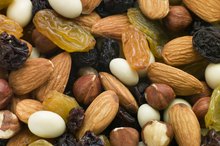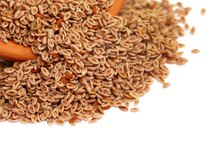What does fact checked mean?
At Healthfully, we strive to deliver objective content that is accurate and up-to-date. Our team periodically reviews articles in order to ensure content quality. The sources cited below consist of evidence from peer-reviewed journals, prominent medical organizations, academic associations, and government data.
The information contained on this site is for informational purposes only, and should not be used as a substitute for the advice of a professional health care provider. Please check with the appropriate physician regarding health questions and concerns. Although we strive to deliver accurate and up-to-date information, no guarantee to that effect is made.
Foods to Avoid for Colitis Sufferers
Colitis is a chronic disease that causes open sores and inflammation in the lining of your rectum and colon, causing abdominal pain, frequent bowel emptying and diarrhea. Though symptoms can affect people of all ages, according to the National Digestive Diseases Information Clearinghouse, they typically appear between ages 15 and 30 and may worsen in response to emotional stress and eating certain foods. In addition to medical treatments, a healthy dietary lifestyle may help reduce the frequency or severity of your symptoms.
If you are experiencing serious medical symptoms, seek emergency treatment immediately.
High-fiber Starches
Starches, such as breads, pasta and cereals, provide glucose -- your body's main food-derived energy source. Fiber-rich foods are a staple of most healthy diets, since fiber promotes digestive function and cardiovascular health. If you have an inflammatory bowel disease such as colitis, however, fiber-rich foods may worsen gas, bloating and diarrhea, according to MayoClinic.com. Avoid high-fiber starches, such as whole-wheat bread and pasta, bran muffins and high-fiber cereals, when your symptoms are active. If your symptoms are in remission, consume fiber-rich foods in modest, gradual amounts, to allow your digestive system time to adjust.
- Starches, such as breads, pasta and cereals, provide glucose -- your body's main food-derived energy source.
- If you have an inflammatory bowel disease such as colitis, however, fiber-rich foods may worsen gas, bloating and diarrhea, according to MayoClinic.com.
Certain Fruits and Vegetables
Can I Eat Peanut Butter With My Colitis?
Learn More
High-fiber fruits and vegetables, such as artichokes, legumes and raspberries, may also exacerbate colitis symptoms. Because fruits and vegetables are top sources of antioxidants -- nutrients that strengthen your body's ability to defend itself against infections and disease -- consume varieties you tolerate regularly. If your doctor recommends a low-residue diet, which reduces activity in your digestive tract, the Crohn's and Colitis Foundation of America recommends avoiding "scrappy" foods, such raw fruits and vegetables. Well-cooked and peeled fruits and vegetables provide useful alternatives. Other fruits and vegetables that may worsen gas include broccoli, cauliflower, cabbage and Brussels sprouts. Since foods affect people with colitis differently, take note of and limit items that pose problems.
- High-fiber fruits and vegetables, such as artichokes, legumes and raspberries, may also exacerbate colitis symptoms.
- If your doctor recommends a low-residue diet, which reduces activity in your digestive tract, the Crohn's and Colitis Foundation of America recommends avoiding "scrappy" foods, such raw fruits and vegetables.
Greasy Foods
Colitis may make it difficult for you to digest high-fat and greasy foods. Incomplete fat absorption may cause gas and diarrhea, according to the CCFA, particularly if much of your bowel has been surgically removed.
Dairy Products
Gluten-Free Diet for Ulcerative Colitis
Learn More
Dairy products are valuable sources of protein, calcium and vitamin D. However, avoiding or eliminating dairy products may improve gas and abdominal pain associated with colitis, according to MayoClinic.com. If milk, yogurt, cheese and sour cream seem to worsen your symptoms, consume non-dairy equivalents instead. Consume lactose-free or soy-based milk instead of cow's milk, for example. Other lactose-free calcium sources include tofu, almonds, fortified orange juice and canned tuna, salmon and sardines.
- Dairy products are valuable sources of protein, calcium and vitamin D. However, avoiding or eliminating dairy products may improve gas and abdominal pain associated with colitis, according to MayoClinic.com.
- Other lactose-free calcium sources include tofu, almonds, fortified orange juice and canned tuna, salmon and sardines.
Related Articles
References
- Kakodkar S, Mutlu EA. Diet as a Therapeutic Option for Adult Inflammatory Bowel Disease. Gastroenterol Clin North Am. 2017;46(4):745-767. doi:10.1016/j.gtc.2017.08.016
- Guadagnoli L, Mutlu EA, Doerfler B, Ibrahim A, Brenner D, Taft TH. Food-related quality of life in patients with inflammatory bowel disease and irritable bowel syndrome. Qual Life Res. 2019;28(8):2195-2205. doi:0.1007/s11136-019-02170-4
- Nakanishi M, Matz A, Klemashevich C, Rosenberg DW. Dietary Walnut Supplementation Alters Mucosal Metabolite Profiles During DSS-Induced Colonic Ulceration. Nutrients. 2019;11(5)
- Marcelino G, Hiane PA, Freitas KC, et al. Effects of Olive Oil and Its Minor Components on Cardiovascular Diseases, Inflammation, and Gut Microbiota. Nutrients. 2019;11(8):1826. Published 2019 Aug 7. doi:10.3390/nu11081826
- Crohn’s & Colitis Foundation. What Should I Eat? | Patients & Caregivers. www.crohnscolitisfoundation.org. Published 2019.
- Gubatan J, Mitsuhashi S, Zenlea T, Rosenberg L, Robson S, Moss AC. Low Serum Vitamin D During Remission Increases Risk of Clinical Relapse in Patients With Ulcerative Colitis. Clinical Gastroenterology and Hepatology. 2017;15(2):240-246.e1. doi:10.1016/j.cgh.2016.05.035
Writer Bio
August McLaughlin is a certified nutritionist and health writer with more than nine years of professional experience. Her work has been featured in various magazines such as "Healthy Aging," "CitySmart," "IAmThatGirl" and "ULM." She holds specializations in eating disorders, healthy weight management and sports nutrition. She is currently completing her second cookbook and Weight Limit—a series of body image/nutrition-related PSAs.









